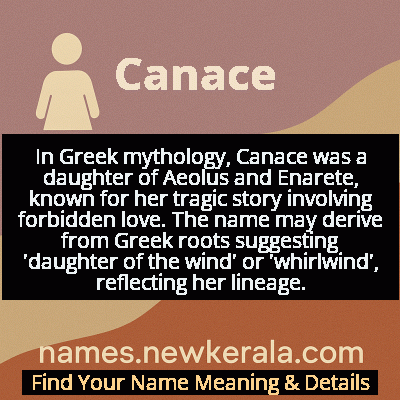Canace Name Meaning & Details
Origin, Popularity, Numerology Analysis & Name Meaning of Canace
Discover the origin, meaning, and cultural significance of the name CANACE. Delve into its historical roots and explore the lasting impact it has had on communities and traditions.
Name
Canace
Gender
Female
Origin
Greek
Lucky Number
9
Meaning of the Name - Canace
In Greek mythology, Canace was a daughter of Aeolus and Enarete, known for her tragic story involving forbidden love. The name may derive from Greek roots suggesting 'daughter of the wind' or 'whirlwind', reflecting her lineage.
Canace - Complete Numerology Analysis
Your Numerology Number
Based on Pythagorean Numerology System
Ruling Planet
Mars
Positive Nature
Generous, passionate, energetic, and humanitarian.
Negative Traits
Impulsive, impatient, moody, and can be overly emotional.
Lucky Colours
Red, maroon, scarlet.
Lucky Days
Tuesday.
Lucky Stones
Red coral, garnet.
Harmony Numbers
1, 2, 3, 6.
Best Suited Professions
Military, sports, philanthropy, leadership roles.
What People Like About You
Courage, energy, leadership, generosity.
Famous People Named Canace
Canace (Mythological)
Mythological Figure
Central figure in tragic incestuous love story with brother Macareus in Greek mythology
Canace (Literary)
Literary Character
Featured in Ovid's Heroides and Boccaccio's works as archetype of tragic love
Canace (Operatic)
Opera Character
Represented in Baroque opera as embodiment of tragic femininity and forbidden passion
Name Variations & International Equivalents
Click on blue names to explore their detailed meanings. Gray names with will be available soon.
Cultural & Historical Significance
Extended Personality Analysis
The name Canace evokes a complex personality profile rooted in mythological symbolism and literary tradition. Bearers of this name are often associated with deep emotional intensity, artistic sensitivity, and a tragic romanticism. The original mythological character demonstrates remarkable courage in facing the consequences of her forbidden love, suggesting modern name-bearers might share qualities of resilience and emotional honesty. There's typically an association with creative expression—many named Canace are drawn to artistic pursuits, writing, or performance arts. The name suggests someone with strong family connections and loyalty, yet potentially prone to intense, all-consuming relationships. Psychological traits might include introspection, emotional depth, and a certain melancholy wisdom born from understanding life's complexities. The mythological background lends an air of classical dignity combined with passionate intensity, creating a personality type that balances intellectual depth with emotional vulnerability.
Modern Usage & Popularity
In contemporary naming practices, Canace remains an exceptionally rare choice, typically selected by parents with strong interests in classical mythology, literature, or seeking unique names with deep historical roots. The name has never appeared in Social Security Administration name rankings or equivalent lists in other English-speaking countries, maintaining its status as an obscure mythological reference. Recent years have seen growing interest in mythological names, potentially increasing Canace's visibility among parents looking for distinctive classical names outside the mainstream. The name finds occasional use in academic families, particularly those with classical studies backgrounds, and among parents drawn to tragic romantic figures from mythology. Its usage patterns suggest it appeals to those valuing literary heritage and symbolic depth over popularity, making it a choice that signals cultural sophistication and appreciation for classical traditions in modern naming conventions.
Symbolic & Spiritual Meanings
Symbolically, Canace represents multiple layers of meaning that have evolved from her mythological origins. Primarily, she embodies the concept of forbidden love and its tragic consequences, serving as a powerful metaphor for passions that defy social conventions. Her connection to Aeolus, god of winds, adds elemental symbolism—representing emotional storms, unpredictable change, and the invisible forces that shape human destiny. The story symbolizes the conflict between natural desire and societal restrictions, making Canace an enduring symbol of love that transcends boundaries but must pay the ultimate price. Metaphorically, she represents the idea that some loves are doomed by circumstance rather than lack of genuine feeling, and her narrative warns about the dangers when personal passion clashes with established order. The name has come to symbolize tragic beauty, the price of authenticity in a conformist world, and the eternal human struggle between heart and duty.

